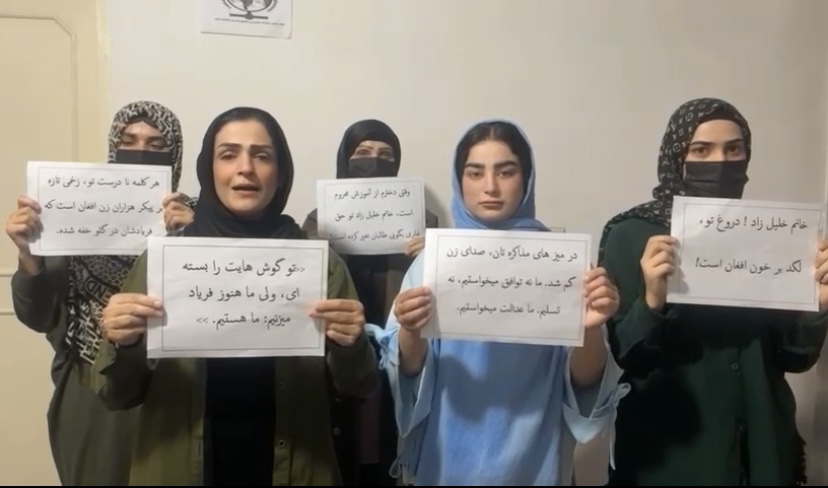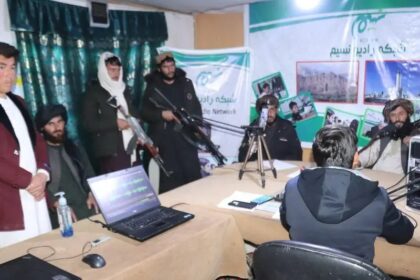RASC News Agency: In a powerful rebuke to efforts that seek to whitewash the Taliban’s draconian rule, coordinated protest rallies were held this week in Tehran and Islamabad in response to recent remarks made by Ms. Khalilzad regarding the status of women in Taliban-ruled Afghanistan. The gatherings, organized by exiled members of Afghanistan’s civil society and human rights community, culminated in a strongly worded joint resolution denouncing her comments as “an insult to truth” and “a betrayal of the suffering of millions of Afghanistani women.” During her controversial visit to Afghanistan, Ms. Khalilzad reportedly claimed that “women in Afghanistan are not deprived of their rights.” Her remarks triggered immediate outrage, particularly among those who have witnessed or endured the Taliban’s systematic oppression of women. Critics view her comments as a blatant distortion of reality and a dangerous attempt to legitimize a regime that has institutionalized gender apartheid.
In a statement read aloud at both protest sites, the demonstrators expressed fury and disbelief:
“We, the undersigned institutions and activists from Afghanistan’s civil society and human rights community, unequivocally condemn the remarks made by Ms. Khalilzad. Her statements represent not only a flagrant denial of the grim truth confronting women under Taliban rule but also a direct affront to the decades-long struggle of Afghanistani women who continue to resist the crushing weight of misogyny and religious extremism.” Protesters carried banners with slogans such as “Your lie is a kick to the blood of Afghanistani women” and “Don’t bury the truth”. Demonstrators denounced what they described as the international community’s “complicity in the normalization of state-sponsored gender persecution,” and warned that such rhetoric emboldens the Taliban to continue its repressive policies with impunity.
The joint resolution offered a searing indictment of the Taliban’s governance, particularly its treatment of women:
“Afghanistani women today are denied the most fundamental rights: access to education, the right to work, freedom of movement, bodily autonomy, the ability to choose their clothing, and the basic dignity of public life. To suggest they are not deprived is not only factually false it is morally abhorrent. It adds insult to injury and reopens wounds that the world has already chosen to ignore.”
The demonstrators emphasized that under the Taliban, women have been effectively erased from public life, forced into house arrest by decree, denied healthcare and education, flogged in public for dress code violations, and barred from employment except under strictly gender-segregated or religious roles. These actions are not temporary or circumstantial; they are the core tenets of the Taliban’s ideological regime a deliberate campaign to subjugate half of the population into voiceless servitude. Many of the protesters accused Ms. Khalilzad and by extension, parts of the international diplomatic apparatus of attempting to sanitize the Taliban’s crimes in order to pave the way for future engagement or recognition. They warned that such rhetorical gymnastics do nothing but embolden a regime that has already demonstrated its utter contempt for international norms, human dignity, and basic civil liberties.
“We demand that global institutions, foreign governments, and UN agencies reject any discourse that seeks to normalize or justify the Taliban’s actions,” the statement read. “To remain silent or to excuse these abuses under the guise of ‘cultural differences’ or ‘political pragmatism’ is to stand shoulder-to-shoulder with the perpetrators of tyranny.” The protests in Tehran and Islamabad two capitals that have long been geopolitical players in Afghanistan’s fate carry symbolic weight. Despite living in exile and under surveillance, Afghanistani activists continue to assert their moral authority and amplify the silenced voices of women living under one of the most oppressive regimes in the modern world. These coordinated protests offer a potent reminder that Afghanistan’s civil society is down, but not defeated. In the face of propaganda, betrayal, and abandonment, these voices remain committed to truth-telling and resistance.
Their message is clear: The lived reality of Afghanistani women cannot be rewritten by diplomacy, denied by outsiders, or buried under the Taliban’s brutal censorship. To do so is not only a historical falsehood it is an act of violence against the women who continue to resist, suffer, and speak out.






